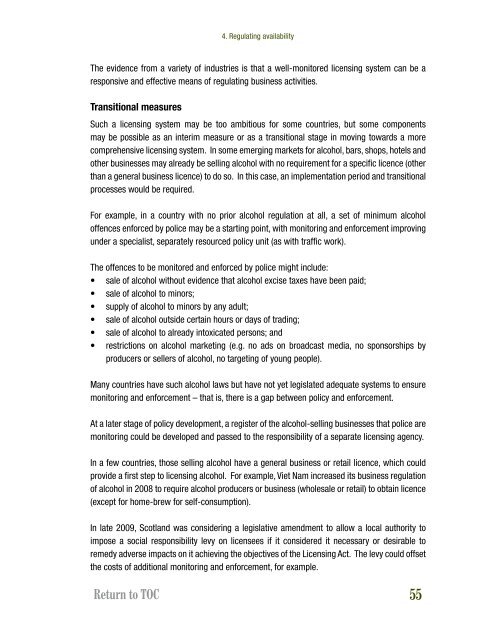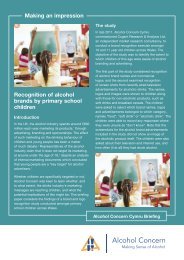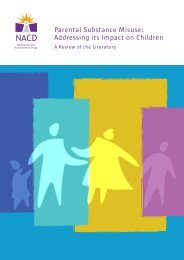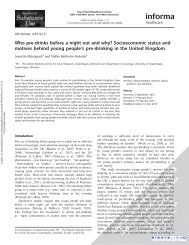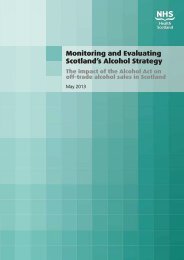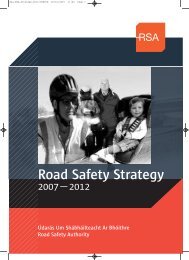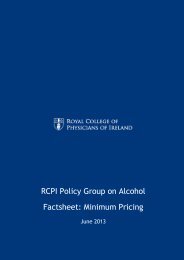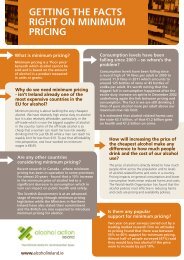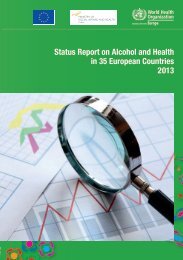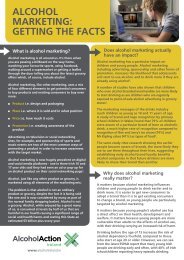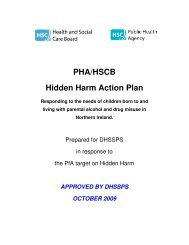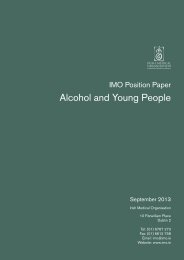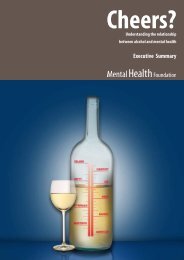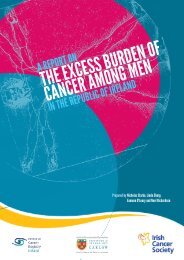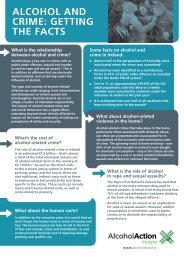Addressing the harmful use of alcohol - WHO Western Pacific Region
Addressing the harmful use of alcohol - WHO Western Pacific Region
Addressing the harmful use of alcohol - WHO Western Pacific Region
You also want an ePaper? Increase the reach of your titles
YUMPU automatically turns print PDFs into web optimized ePapers that Google loves.
4. Regulating availability<br />
The evidence from a variety <strong>of</strong> industries is that a well-monitored licensing system can be a<br />
responsive and effective means <strong>of</strong> regulating business activities.<br />
Transitional measures<br />
Such a licensing system may be too ambitious for some countries, but some components<br />
may be possible as an interim measure or as a transitional stage in moving towards a more<br />
comprehensive licensing system. In some emerging markets for <strong>alcohol</strong>, bars, shops, hotels and<br />
o<strong>the</strong>r businesses may already be selling <strong>alcohol</strong> with no requirement for a specific licence (o<strong>the</strong>r<br />
than a general business licence) to do so. In this case, an implementation period and transitional<br />
processes would be required.<br />
For example, in a country with no prior <strong>alcohol</strong> regulation at all, a set <strong>of</strong> minimum <strong>alcohol</strong><br />
<strong>of</strong>fences enforced by police may be a starting point, with monitoring and enforcement improving<br />
under a specialist, separately resourced policy unit (as with traffic work).<br />
The <strong>of</strong>fences to be monitored and enforced by police might include:<br />
• sale <strong>of</strong> <strong>alcohol</strong> without evidence that <strong>alcohol</strong> excise taxes have been paid;<br />
• sale <strong>of</strong> <strong>alcohol</strong> to minors;<br />
• supply <strong>of</strong> <strong>alcohol</strong> to minors by any adult;<br />
• sale <strong>of</strong> <strong>alcohol</strong> outside certain hours or days <strong>of</strong> trading;<br />
• sale <strong>of</strong> <strong>alcohol</strong> to already intoxicated persons; and<br />
• restrictions on <strong>alcohol</strong> marketing (e.g. no ads on broadcast media, no sponsorships by<br />
producers or sellers <strong>of</strong> <strong>alcohol</strong>, no targeting <strong>of</strong> young people).<br />
Many countries have such <strong>alcohol</strong> laws but have not yet legislated adequate systems to ensure<br />
monitoring and enforcement – that is, <strong>the</strong>re is a gap between policy and enforcement.<br />
At a later stage <strong>of</strong> policy development, a register <strong>of</strong> <strong>the</strong> <strong>alcohol</strong>-selling businesses that police are<br />
monitoring could be developed and passed to <strong>the</strong> responsibility <strong>of</strong> a separate licensing agency.<br />
In a few countries, those selling <strong>alcohol</strong> have a general business or retail licence, which could<br />
provide a first step to licensing <strong>alcohol</strong>. For example, Viet Nam increased its business regulation<br />
<strong>of</strong> <strong>alcohol</strong> in 2008 to require <strong>alcohol</strong> producers or business (wholesale or retail) to obtain licence<br />
(except for home-brew for self-consumption).<br />
In late 2009, Scotland was considering a legislative amendment to allow a local authority to<br />
impose a social responsibility levy on licensees if it considered it necessary or desirable to<br />
remedy adverse impacts on it achieving <strong>the</strong> objectives <strong>of</strong> <strong>the</strong> Licensing Act. The levy could <strong>of</strong>fset<br />
<strong>the</strong> costs <strong>of</strong> additional monitoring and enforcement, for example.<br />
Return to TOC<br />
55


